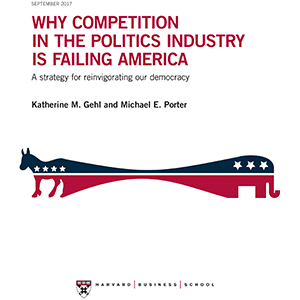
Businesses can succeed globally while workers have a high and rising standard of living. That’s how Harvard Business School defines a competitive economy. As a business leader, Katherine Gehl is deeply concerned that the U.S. is not on a competitive path. For the last several years, our businesses have been making record profits, but workers’ wages have not kept pace. In the words of Michael Porter and his colleagues, the economy is doing half its job.
The challenges we face are systemic, and many require policy action at the national level. Among business leaders from all sides of the political spectrum, there’s fairly broad consensus about the top policy priorities that will help reinvigorate American competitiveness: fix the debt and the tax code, enact comprehensive energy policy, invest in our infrastructure, and strengthen our K-12 education system.
Despite widespread consensus on these issues, our political leaders haven’t made any progress. Because of structural factors – like our primary system and redistricting – both our candidates and our elected leaders increasingly reflect the interests of the ideologues and refuse to break ranks and work across the aisle. It’s clear that in order to address any of these critical weaknesses, we have to fix the political system first.
As business leaders, we stand on the front line of this challenge. If U.S. competitiveness suffers because of our broken political system, we’ll see it first. Our growth will slow, our ability to hire and pay good wages will contract, and our ability to innovate will suffer.
We can have a future where businesses turn a profit and living standards rise across the board. But it’s going to take an honest reckoning about where we are today and where we want to go. We can and should make our voices heard. Our businesses depend on it. Our employees depend on it. And ultimately our democracy depends on it.